The Mainstream Phoenix Rises: Samsung's 970 EVO (500GB & 1TB) SSDs Reviewed
by Billy Tallis on April 24, 2018 10:00 AM ESTAnandTech Storage Bench - Heavy
Our Heavy storage benchmark is proportionally more write-heavy than The Destroyer, but much shorter overall. The total writes in the Heavy test aren't enough to fill the drive, so performance never drops down to steady state. This test is far more representative of a power user's day to day usage, and is heavily influenced by the drive's peak performance. The Heavy workload test details can be found here. This test is run twice, once on a freshly erased drive and once after filling the drive with sequential writes.
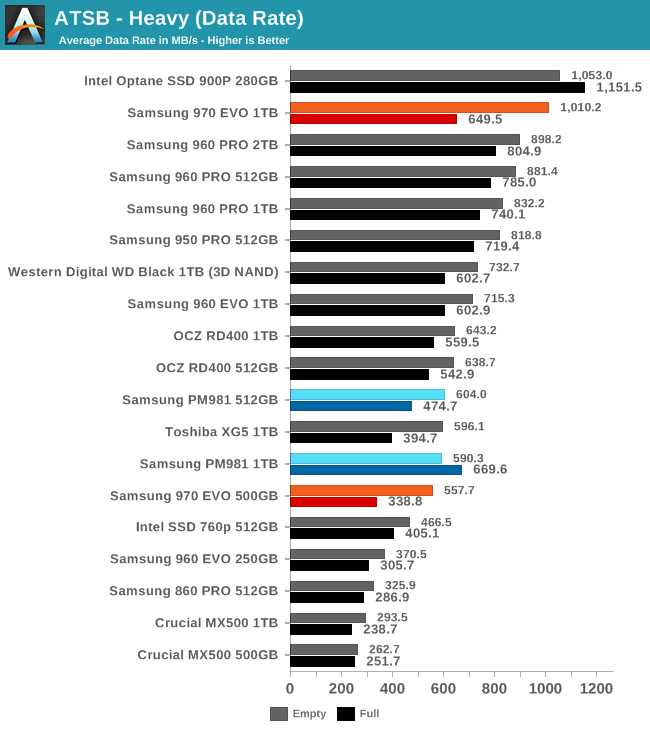
Our initial runs of the Heavy test on the Samsung 970 EVO produced results similar to the Samsung PM981, with the 1TB model showing worse performance on an empty drive than a full drive. This seems to be related to the secure erase process used to wipe the drive before the test. Like many drives, the 970 EVO seems to lie about when it has actually finished cleaning up. Adding an extra 10 minutes of idle time before launching the Heavy test produced the results seen here, and in the future all drives will be tested with longer pauses after erasing (all other drives were given at least two minutes of idle time after each erase).
With the odd behavior eliminated, the Samsung 970 EVO comes close to setting a new record on the Heavy test. The empty drive performance of the 1TB model is up in Optane territory, though the full drive average data rate is not much higher than other TLC-based drives. The 500GB model is far slower, and its full-drive performance doesn't even keep pace with the Intel SSD 760p.
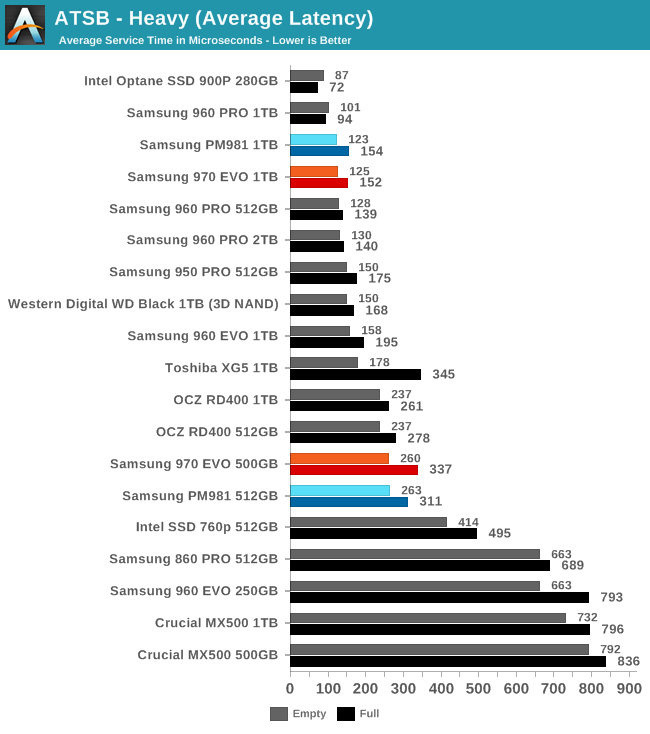
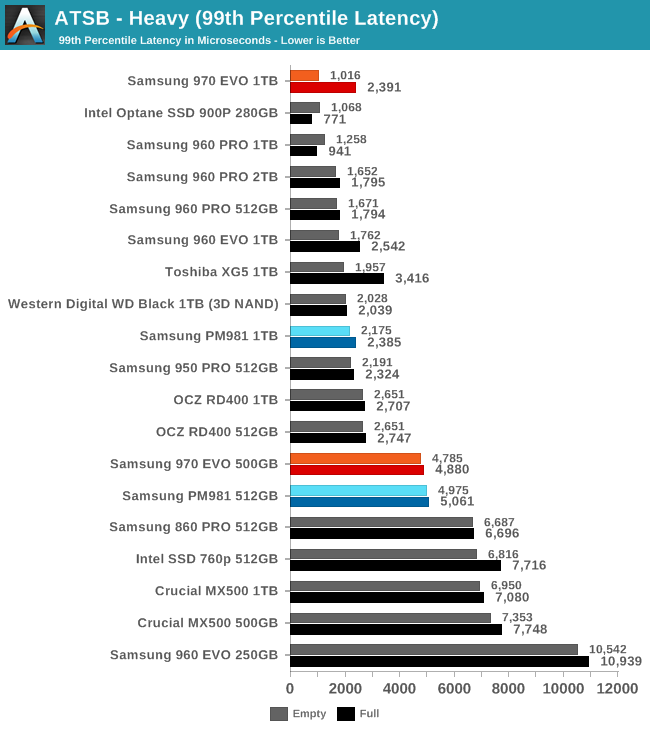
The average and 99th percentile latency scores from the Samsung 970 EVO are about normal and in line with its closest competitors, except for the particularly good empty-drive score from the 1TB 970 EVO.
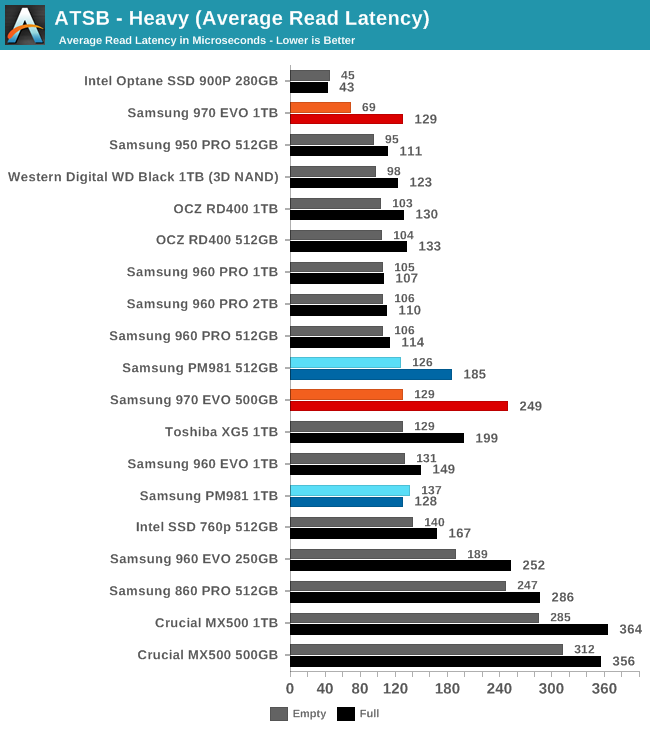
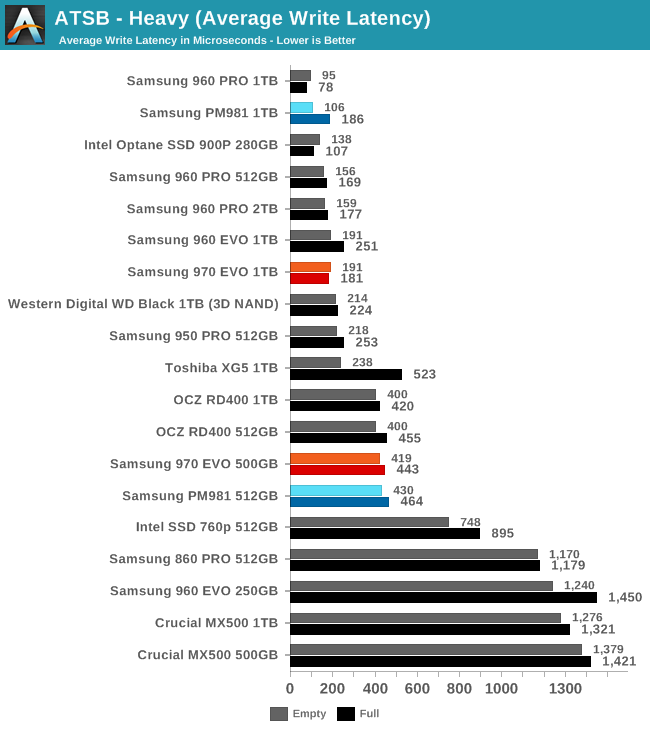
The average write latency of the 970 EVO is fairly typical for a high-end NVMe SSD, but the average read latency of the 1TB 970 EVO in the best case is surprisingly quick. Both capacities show a larger than normal gap between empty and full drive performance, even after accounting for the fact that they are using TLC to compete against the best MLC drives.
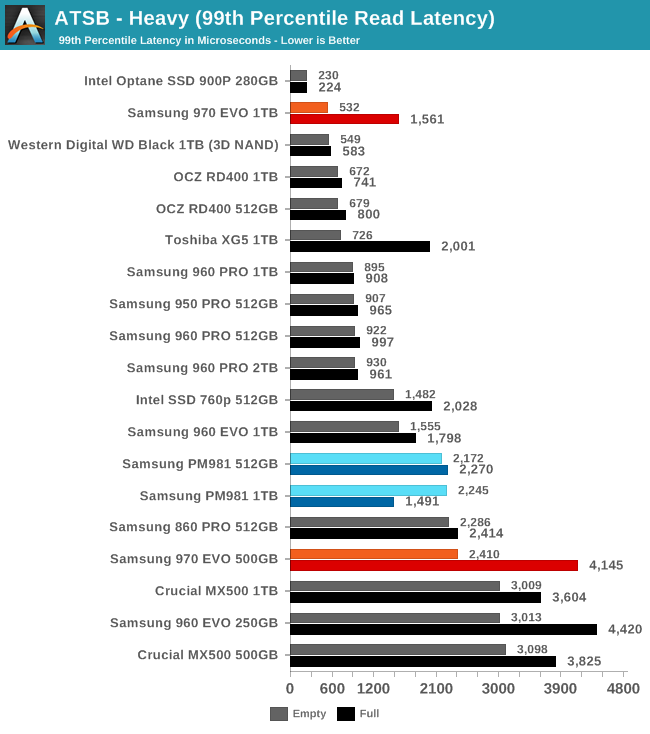
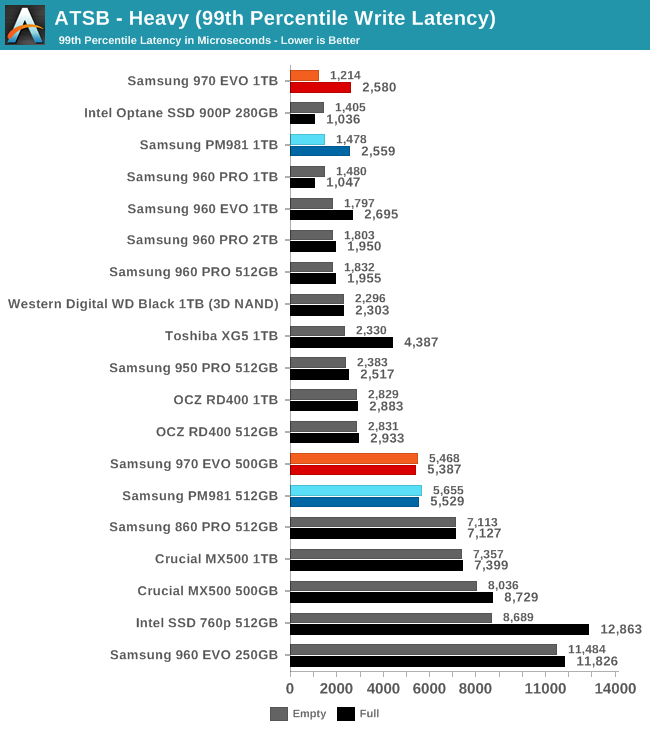
The 99th percentile read latency scores from both tested capacities of the 970 EVO show a big difference between full drive and empty drive performance. The 500GB drive's read QoS doesn't seem up to par, but the 1TB model's scores would look pretty good if the WD Black hadn't recently shown up with an MLC-like minimal performance loss when full. The 99th percentile write latency scores of the 970 EVO are good but not substantially better than the competition, and the 500GB model is clearly worse at keeping latency under control than the 1TB model or MLC drives of similar capacity.
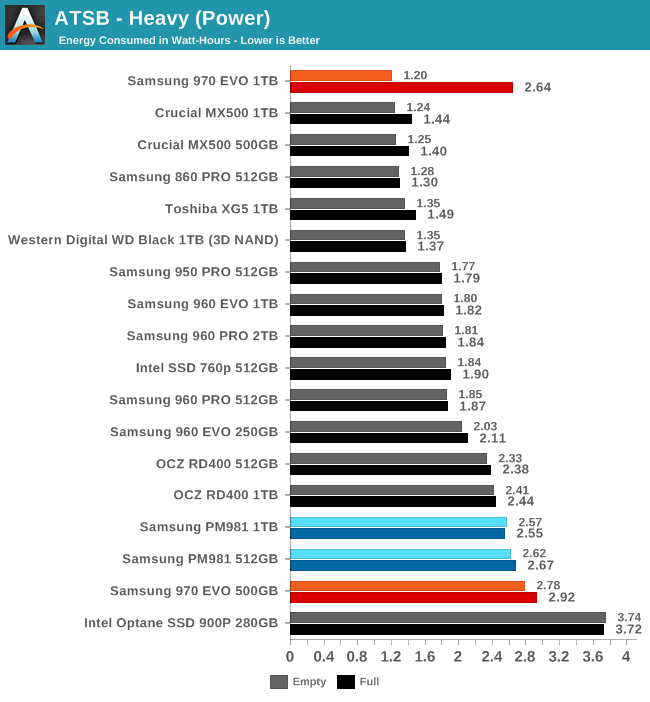
The 500GB 970 EVO continues the trend of relatively poor power efficiency from the Samsung Phoenix controller, but the 1TB model in its best case of running the test on an empty drive is fast enough that its overall energy usage is comparable to good SATA drives.










68 Comments
View All Comments
bji - Tuesday, April 24, 2018 - link
You're kind of arguing against benchmarking in general here. Almost no benchmarks are directly relevant to any one person's intended use of the product. Benchmarks are not useful in that they tell me exactly how much performance to expect when running one specific program on one specifically configured hardware setup. They are useful because they allow extrapolation from measured results to expected results on workloads that actually matter to the reader.So I don't agree with your sentiment that Meltdown/Spectre are not worth consideration for their effect on system performance.
However, I am not sure that I would include Meltdown/Spectre considerations in a specific SSD review. I think these considerations deserve to be in a CPU review.
bji - Tuesday, April 24, 2018 - link
Also, may I say that users generally will not notice a 5% slowdown in any particular task; however, we've already established that readers care about minimum differences in benchmark results, because they routinely call a 5% difference clear indication of a "winner" and a "loser" for that benchmark, so for the purposes of performance reviews, the 5% difference contributed by Meltdown/Spectre definitely matters.Flying Aardvark - Tuesday, April 24, 2018 - link
It's up to 50% reduction in storage performance not 5%. You'll feel 50% loss when it happens to you.cmdrdredd - Tuesday, April 24, 2018 - link
What you are saying is misleading. SATA performance is nearly identical (within 2% difference for me). It's NVMe drives that take the hit, but even still they are faster than everything else. Processor speed is unaffected for me as well. Tested multiple times with various benchmarks both ways and it was within margin of error. I don't see the problem to be honest.LurkingSince97 - Wednesday, April 25, 2018 - link
Tell that to my I/O intensive servers that suddenly have 30% less throughput.modeonoff - Tuesday, April 24, 2018 - link
Yes but I am not an average customer. Performance is important for me.Ryun - Tuesday, April 24, 2018 - link
For everyday tasks do you guys notice an improvement in responsiveness of NVMe SSDs versus SATA SSDs?The transfer rates are definitely impressive, I've just never seen a review where I've wanted to upgrade my 500GB SATA SSD for development/gaming/maintenance tasks on my machine. Seems like boot times and opening programs are within a couple seconds of another between NVMe and SATA. Nothing like the jump between HDDs vs SSDs.
HollyDOL - Tuesday, April 24, 2018 - link
I wonder myself, got Vertex 3 (240GB) and while not permanently watching perf counters I don't see much cases of 100% load. Wonder if I would be able to see a difference if I moved to some "best enthusiast m.2/pcie ssd available". (Rest of the machine is fully capable)eek2121 - Tuesday, April 24, 2018 - link
I notice it in certain tasks. My system can get from cold boot to the login screen in about 3 seconds for instance. Editing video is much faster as well.imaheadcase - Tuesday, April 24, 2018 - link
I wouldnt say a huge performance, it really depends on certain tasks that you work with. If you work with file manager a lot with big files sure. But most people no. It makes sense if just upgrading though.